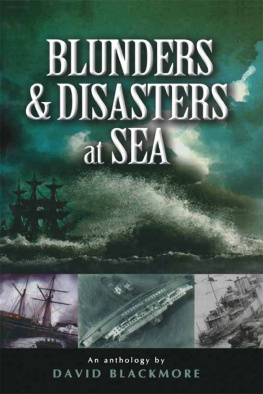Blunders and
Disasters
at Sea
Blunders and
Disasters
at Sea
David Blackmore
First published in Great Britain in 2004 by
Pen & Sword Maritime
an imprint of
Pen & Sword Books Ltd
47 Church Street
Barnsley
South Yorkshire
S70 2AS
Copyright David Blackmore, 2004
ISBN 1 84415 117 4
The right of David Blackmore to be identified as Author of this Work has
been asserted by him in accordance with the Copyright, Designs and Patents
Act 1988.
A CIP catalogue record for this book is
available from the British Library
All rights reserved. No part of this book may be reproduced or transmitted in
any form or by any means, electronic or mechanical including photocopying,
recording or by any information storage and retrieval system, without permission
from the Publisher in writing.
Typeset in 10/12pt Plantin by
Phoenix Typesetting, Auldgirth, Dumfriesshire
Printed and bound in England by
CPI UK
Pen & Sword Books Ltd incorporates the imprints of Pen & Sword Aviation,
Pen & Sword Maritime, Pen & Sword Military, Wharncliffe Local History,
Pen & Sword Select, Pen & Sword Military Classics and Leo Cooper.
For a complete list of Pen & Sword titles please contact
PEN & SWORD BOOKS LIMITED
47 Church Street, Barnsley, South Yorkshire, S70 2AS, England
E-mail: enquiries@pen-and-sword.co.uk
Website: www.pen-and-sword.co.uk
For Paula
Whose spousal support
and encouragement
were essential
And for Binkie
Whose sibling example
was always a spur
Contents
Somewhere, sometime, deep in the mists of prehistory, one can imagine a proto-human clambering onto a piece of driftwood or floating tree trunk. After learning how to keep his balance, he discovered he could use his hands or a leafy branch to propel his craft forward. Delighted, he returned to his village to tell fellow clanspeople of the remarkable find.
Now, he said, now we can cross the deep river to hunt those herds we can see grazing on the far bank! Now we can reach that island to harvest its bounty of gulls eggs!
Later, or possibly sooner, one of them became the first mariner to blunder and drown. Perhaps he thought he could paddle across the deceptively slow-flowing river before being sucked into whitewater rapids. Perhaps he was unaware of the offshore current on the far side of the island. Whatever the reason, he had started a long trail of waterborne stupidity and misfortune.
From the reed boats of ancient Babylon to modern ocean giants, mankind has been venturing onto the rivers, lakes, seas and oceans, which cover almost three-quarters of our globe. But these waters are some of natures most magnificent and potent forces, demanding extreme caution and respect.
They are highly temperamental, sometimes resting in mirror-like calm, at others ranting and raging to throw up twenty-metre (sixty-five foot) waves. Their natural forces are compounded in time of war because the urgency and complexity of armed conflict frequently result in human error and miscalculation.
Because of such hazards, maritime mistakes tend to be irreversible to an extent seldom encountered on land. They frequently result in the loss of a ship, together with many lives. Moreover, with every technological advance, ships grow in size and the scale of disaster tends to grow in proportion.
The Hittites were a timocracy (as Plato calls a state run by a warrior class). By the thirteenth century BCE (Before the Current Era), their hegemony extended from the Aegean Coast to the Tigris River and from the Dardanelles to the mountains of Lebanon. They shared superpower status and a common border with Egypt.
The destruction of Troy, around 1260 BCE, had exposed the Hittite flank to seaborne invasion and, in 1210 BCE, King Suppiluliuma II fought a battle off Cyprus, possibly against the powerful seafaring coalition, which the Egyptians later called Peoples of the Isles or Sea Peoples. His defeat of the hostile fleet was recorded on clay tablets, making it the first naval engagement which can be accurately dated.
A generation later, the Sea Peoples advanced southward by both land and sea, overrunning the Aegean and Asia Minor, destroying the mighty Hittite Empire, and invading the Levant. In inscriptions on temple walls, the scribes of Pharaoh Ramses II reported:
Behold, the northern countries, which are in their isles, are restless they infest the river mouths. The islands pour out their people all together and no country can stand against their arms They are coming towards Egypt their hearts confident, full of their plans.
Their first encounter with Egypt was on land; pictorial inscriptions show Egyptian chariots, led by Pharaoh Ramses in person, smashing through the invading army to fall on lumbering ox-carts loaded with women, children, and provisions.
The land column was defeated and scattered into the Judean hills, but the powerful seaborne force continued southward toward the Nile Delta, where Ramses set up a deadly ambush, hiding ships in tributaries of the main channel, and soldiers amid the tall reeds and papyrus which line its banks. His inscriptions say:
I made the river mouth like a strong wall with warships, galleys, and skiffs completely equipped both fore and aft with brave fighters carrying their weapons The net is made ready for them, to ensnare them. Entering stealthily into the river mouth they fall into it. They penetrate the channels of the river mouths the full flame is in front of them a stockade of spears surrounds them on the river bank.
This implies he set reeds and rushes aflame to halt the advance, but fire is not depicted on reliefs of the battle, which show the invading vessels with prows carved into ducks bills, their crews clearly identified by short kilts and magnificent feathered headgear sailing blithely into the main channel with rowing benches unmanned and marines at rest. They advanced as an undisciplined mass, with no scouts out in front.
Soon they came under a devastating shower of missiles launched by archers lining the shores, and others standing on Egyptian galleys. The surprise was so complete that the invaders were still under sail, while the reliefs show one of the enemy lookouts pierced by an arrow and hanging dead in his crows-nest.
Other reliefs show Ramses fleet moving in for the kill, ramming and grappling, while Egyptian marines, wielding shields and spears, swarm aboard the unprepared enemy decks. One of the Sea Peoples ships has capsized, and its crewmen stand on an Egyptian galley with their arms bound. Others swim to shore, to be picked off by waiting Egyptian archers.
The first naval engagement for which there are both textual and pictorial records ended in total victory for Egypt, thanks to the invading admirals overconfidence and lack of forethought. Ramses claims he was merciful to survivors, settling them in strongholds under his control, and taxing them in cloth and grain. It is probable that a tribe called the Libu was settled in and gave its name to Libya, while the Peleset did the same for Palestine.
In 499BCE, Ionia rebelled against Persian rule, calling for help from the mainland Greeks. Sparta refused military aid, but Athens and Eretria sent troops. With the advantage of surprise, the combined armies advanced rapidly inland, capturing, sacking and burning the city of Sardis. Then the mainlanders prematurely decided their part of the job had been done, and withdrew their expeditionary forces. The abandoned Ionians continued to fight defensively against overwhelming odds, but were brutally crushed.














